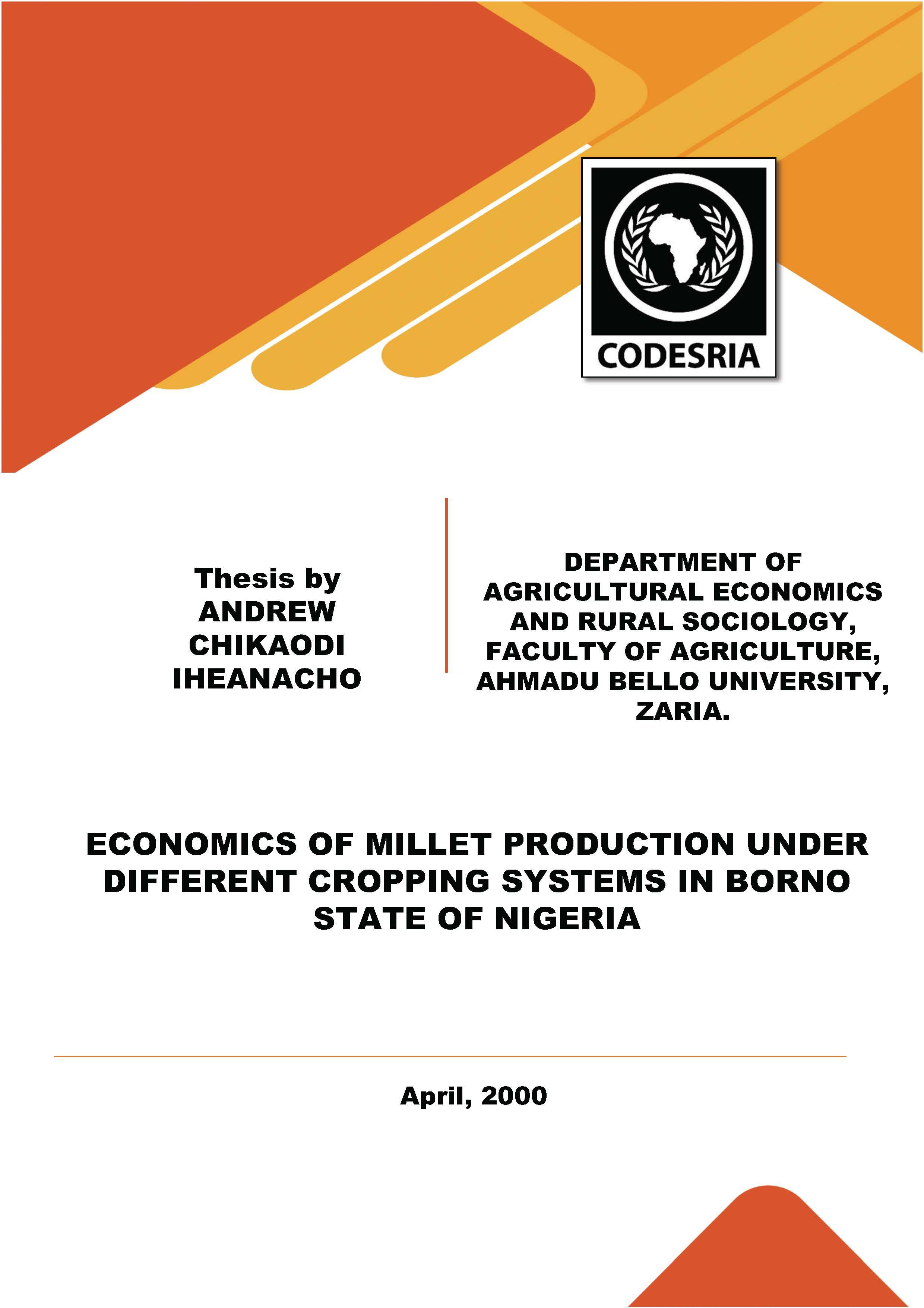Economics of millet production under different cropping systems in Borno State of Nigeria
Keywords:
Agricultural production, millet, cultivation systems, NigeriaSynopsis
Th purpose ofthe study was to cietermine the economics of millet production under different cropping systems in Borno State of Nigeria .. The specific objectives were to identify the socio- economic characteristics of the millet growing farmers; determine the resource use in the cropping , systems; determine the relationship between socio-ecoriomic variables and agricultural outputs of • the farmers; determine ' differences in cost and rèturns among millet ' crop mixtures; estimate production functions for millet cropping systems; compare relative importance and resource use efficiency of common resources used in millet crop mixtures; and identify the major technical and ' · socio-economic problèms of the millet growing farmers .. Data for the study were collected using questionnaire· and interview schedüles administered to 1.80 farmers growing millet in mixtures. ·Thirty six (36) farmers were randomly selected from each of the stratum of the five major millet crop mixtures grown in. the study area; namely; millet/ sorghum, millet/ cowpea, milleygroundnut, . millet/sorghum/cowpea andmillet/sorghum/ groundnut . . Analysis of data was achieved by means of simple descriptive statistics, gross margin analysis, multiple regression, analysis of variance (ANOVA) and chi-square statistfo '()f). The major findings of the study indicate that· educational level of the farmers, resident . household size and number of extensimi workers visits were the major socio-economic variables which positively and significantly affected their outputs as indicated by the linear regressiàn model. Age and farming experience were inversely . related to output. Millet/cowpea mixture was the most profitable, with gross margin of N20,689.03. Food security objective, however, was the major reason for growing millet in mixtures.
Downloads
References
Abalu, G. 0. I (1976). "A Note on Crop Mixture under Indigeneous Conditions in Northern Nigeria". The Journal of Development Studies. 12(13): 211-22.
Abalu, G.O.I. (1977). "A Note on Crop Mixtures in Northern Nigeria". Samaru Research Bulletin. 296: 212 - 220.
Aftholder, F. (1995). "Effect of Organic Matter Input on Water Balance and Yield of Millet. under Dry-land Condition11• Field Crops Research, Vol. 41, No.2 pp 109-121.
Ajayi, 0. and D. A. Labe (1990). "The Effects of Sowing Date and Planting Method on Stem Borer Damage in Dauro Millet". Ann. Applied Biology, 117: 487-494.
AppaRao, S.; M. H. Mengesha; C. C. Nwasike; A Ajayi; 0. G. Olabanji and D. Aha (1994).. "Collecting Crop Germ-plasm in Nigeria". Plant Genetic Resources Newsletter. FAO and IPGRI, No. 97, pp.63-66.
Bababe, B.; A. M. Chiroma and Alhassan, A B. (1994). 11Effect of Residue Management. Techniques on Crop Root Development and its Relevance to the Water Use Efficiency in Semi-arid Region". Paper presented at the First International Conference on Research for Development in the Arid Zone of Nigeria, June 19-25, 1994 at Maiduguri, Nigeria (CAZS Silso Colleg , UK)..
Baidu-Ferson, J. (1994). "Comparing Productivity of Millet Based Cropping System for Unstable Environment ofSahel". ICRISAT West and Central Africa. Annual Report, pp. 84-88.
Baker, E.F.I. (1979). "Mixed Cropping in Northern Nigeria. III: Mixtures of Cereals". Exp. Agric 15:361-407.
Baker, E.F.I. (1980). "Mixed Cropping in Northern Nigeria. IV: Extended Trials with Cereal and Groundnuts11• American Journal of Agric. Econ. 62: 395 - 407.
Binswanger, H. (1980) 11Attitudes Towards Risk: Experimental Measurements in Rural lndia11 American Journal of Agric. Econ. 62: 395-407
Brinkman, G. L.; J. A Gellner (1977). 11Chemical Composition and Nutritive Value of Pearl Millet
Grain11• Crop Science. 12:·187·- 188.· ·
Borno State Agricultural Development Programme (BOSADP). Diagnostic Survey Report Central Bank
ofNigeria (1992). Annual Report and Statement of Accounts, Lagos, Nigeria.






